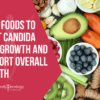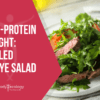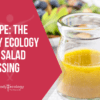The Truth About Acne, Stress, and Constipation
Question: What do acne, mood disorders, and constipation all have in common?
Answer: The gastrointestinal tract.
The skin, the brain, and the gut may seem entirely unrelated to each other. But the truth is that all three influence one other.
Is the Gut the Root of Skin and Mood Disorders?
In the large intestine, you want hearty colonies of beneficial bacteria. In the small intestine, you want plenty of enzymes. You also want small amounts of good bacteria that don’t stay in one place for too long. Finally, it is critical that the cells lining the wall of the small and large intestine are strong and healthy.

Constipation has been directly associated with anxiety and depression. Emotional stress can slow down digestion and even result in leaky gut.
Too often, the inner ecosystem of the gut is diseased. Bad bacteria grow like weeds. The cells lining the small intestine are thin and damaged—and all sorts of bacteria have taken up residence there, feeding on food that should have been broken down by enzymes.
When the inner ecosystem of the gut is unhealthy, this presents a problem for the entire body. The immune system has more work to do, and the brain receives mixed signals.
Constipation and Depression
Constipation is a sure sign that there’s trouble. It means that your inner ecosystem has—for one reason or another—been thrown out of balance.
For example, a 2005 study published in Digestive and Liver Disease found that concentrations of the good bacteria Lactobacillus and Bifidobacteria were significantly lower in those with constipation compared to healthy adults without constipation.
And that’s not all. Those with constipation also had more cases of leaky gut and enhanced systemic immune response. (1)
Still other studies have found that leaky gut is frequently found in those who struggle with depression and that a longer transit time—or constipation—is associated with anxiety and depression. (2)(3)
Emotional stress affects all aspects of digestion. It not only contributes to constipation, it can also weaken and inflame the entire gastrointestinal tract.
In 2005, researchers published a study in the World Journal of Gastroenterology, explaining how stress can slow down normal small intestinal transit time, encourage bacterial overgrowth, and weaken the lining of the gut. (4)
This means that emotional stress, such as worry, fear, frustration, and sadness, can:
- Take a toll on how quickly a meal moves through the gut.
- Encourage bacterial overgrowth, something that can cause bloating, gas, cramping, pain, heartburn, and constipation.
- Make the gut “leaky” or permeable.
Once the intestinal barrier is leaky, food particles and toxic debris from bacteria leak into the bloodstream. The body recognizes these as foreign invaders. Food particles and the toxic debris from bacteria ignite a response from the immune system. This leads to both local and systemic (whole body) inflammation.
Do You Have an Acne Personality?
There is such a close relationship between emotional stress and acne that over the years, researchers and clinicians have suggested that there is an “acne personality.”
Someone with an acne personality is highly reactive and prone to bouts of anxiety and depression. (5) As it turns out, gut bacteria are able to affect all aspects of the acne personality.
Directly and indirectly, beneficial gut bacteria influence:
- Systemic, all-over inflammation
- Levels of oxidative stress
- Levels of mood-regulating neurotransmitters
In one paper, researchers explain that, “Acne is a disease of the gastrointestinal tract.”
Lead author, Alan Logan from the Integrative Care Centre of Toronto goes on to explain that, “Gut microbes, and the integrity of the gastrointestinal tract itself, are contributing factors in the acne process.” (6)
3 Critical Steps to Heal the Gut
At Body Ecology, in addition to removing gluten and limiting sugar, we believe a protocol to support a healthy gut lining, improve digestion, restore important strains of beneficial bacteria, and conquer infection is necessary when addressing acne:
1. Digestive Care Multi – Designed by Donna as an easy approach for busy people to restore balance to their inner ecosystem. It is a unique combination of enzymes, probiotics and beneficial yeast, ocean and plant minerals, and cleansing herbs.
2. InnergyBiotic – A bubbly, refreshing probiotic beverage. A few ounces a day inoculate the digestive tract with important lactobacillus strains of bacteria.
3. Vitality SuperGreen – A dynamic blend of fermented vegetables, algae, herbs, and probiotics. It contains GlutImmune, a super-charged form of glutamine, to address cells in the small intestine that are worn thin and damaged. Studies have found that glutamine is the preferred fuel source for the small intestine. We also know that glutamine increases the number of cells in the small intestine and the height of those cells. (7)(8)
What To Remember Most About This Article:
The health of the gut directly affects:
- Acne
- Mood disorders
- Constipation
Once your inner ecosystem becomes diseased, a common occurrence, it creates issues throughout the entire body. It places a burden on the immune system and sends mixed signals to the brain.
Constipation is an initial sign of an unhealthy inner ecosystem. Constipation has been linked to leaky gut, which is often found in sufferers of depression. Yes, emotional stress can directly affect how quickly food moves through the digestive tract and even trigger bacterial overgrowth to cause cramping, gas, and heartburn.
Acne is also directly related to emotional stress. Likewise, many researchers consider acne to be a disease of the gastrointestinal tract.
The good news is that you can heal your gut in 3 important steps to balance your inner ecosystem:
1. Digestive Care Multi – A unique combination of probiotics, beneficial yeast, enzymes, cleansing herbs, and ocean and plant minerals to heal your inner ecology.
2. InnergyBiotic – A refreshing probiotic drink to inoculate the gut with healthy bacteria.
3. Vitality SuperGreen – A powerful blend of algae, fermented vegetables, herbs, and probiotics, containing GlutImmune to fuel the small intestine.
- [product id=”115″]
- [product id=”169″]
- [product id=”5″]
REFERENCES:
- Khalif IL, Quigley EM, Konovitch EA, Maximova ID. Alterations in the colonic flora and intestinal permeability and evidence of immune activation in chronic constipation. Dig Liver Dis. 2005; 7:838-49.
- Maes M, Kubera M, Leunis JC. The gut-brain barrier in major depression: intestinal mucosal dysfunction with an increased translocation of LPS from gram negative enterobacteria (leaky gut) plays a role in the inflammatory pathophysiology of depression. Neuro Endocrinol Lett. 2008; 29:117-24. 36.
- Gorard DA, Gomborone JE, Libby GW, Farthing MJ. Intestinal transit inanxiety and depression. Gut. 1996; 39:551-5.
- Wang SX, Wu WC. Effects of psychological stress on small intestinal motility and bacteria and mucosa in mice. World J Gastroenerol. 2005; 11:2016-21.
- Polenghi MM, Zizak S, Molinari E. Emotions and acne. Dermatol Psychosom. 2002; 3:20-5.
- Bowe WP, Logan AC. Acne vulgaris, probiotics and the gut-brain-skin axis – back to the future? Gut Pathog. 2011 Jan 31;3(1):1. doi: 10.1186/1757-4749-3-1.
- BR Thomson, et al. Nutritional modulation of the inflammatory response in inflammatory bowel disease- From the molecular to the integrative to the clinical. World J Gastroenterol 2007 January 7;13(1):1-7
- A von Kreel, et al. Glutamine and the preservation of gut integrity. The Lancet. 341(8857): 1363-1365.








